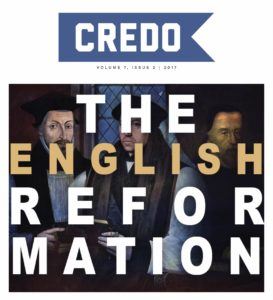William Tyndale (1494-1536) dedicated his life to the translation of the Bible into English. It was the pioneering efforts of Bible-translators like Tyndale, along with the martyr-fires of those such as Ridley and Latimer, of Lady Jane Grey and Anne Askew that helped transform England into a Protestant nation. Born into an important family in the west of Gloucestershire, Tyndale studied at the Universities of Oxford and Cambridge between 1510 and 1521. As Cambridge was teeming with Lutheran ideas at the time, Tyndale may have then adopted his Protestant convictions. He later complained that the universities taught heathen studies while neglecting serious study of Scripture until most had lost their appetite to understand such spiritual truth. After his time at university Tyndale was ordained at some point.
Fluent in seven languages and a scholar of Hebrew and Greek, Tyndale observed that most English clergy knew little more of the Bible than what was listed in their Missal (Mass Book). This astonishing state of affairs served to direct Tyndale toward his own divine vocation. In his disappointment he once quipped to a cleric, “If God spare my life, ere many years pass, I will cause a boy On March 6, 1536, William Tyndale was strangled and burned at the stake. His final words were a prayer and petition, “Lord, open the King of England’s eyes.” Share on Xthat driveth the plough shall know more of the Scriptures than thou dost.” Tyndale perceived that lay people needed the Scripture in their own plain language that “they might see the process, order, and meaning of the text.” Only clergy and Latin scholars, however, could read the Scriptures, for by royal edict they could not be translated into or even read in the “vulgar tongue.” John Wycliffe (1320-1384) had translated the Latin Vulgate into English and his followers the Lollards had clandestinely distributed handwritten copies. This was not the accurate translation Tyndale desired. Further, this Lollard threat had led to laws against any unauthorized English translation.
Tyndale sought to translate the Scriptures from the original languages rather than the Latin Vulgate thus improving on the work of his faithful predecessor Wycliffe. And so began a mission upon which Tyndale would spend the rest of his life at great cost to himself. He first sought the support of the scholarly Cuthbert Tunstall, the Bishop of London and a friend of Erasmus. Tunstall was unfortunately more concerned with fighting Lutheran ideas than publishing the Bible. Failing to gain ecclesiastical support, Tyndale realized that there was no safe venue in all of England from which to carry out his vision. With the hope of completing a translation of the New Testament he went into exile in Germany in 1524. He would never return to England. It appears he went first to Wittenberg for a time of study. In 1522, Martin Luther had published a German translation of the New Testament from the original languages and later an Old Testament in 1534. Tyndale desired the same for English-speakers.
With some dependence upon Luther’s German translation, Tyndale completed the New Testament in English by 1525 and sought to have it printed in Cologne. A raid on the printing press, however, stymied these first efforts, but Tyndale escaped with the pages he had printed. By the next year, 1526, Tyndale fulfilled his promise to that biblically illiterate clergyman. Tyndale had moved to Worms, where five years previous Luther had made his famous declaration, “My conscience is held captive to the Word of God.” It was there that under the direction of Peter Schoeffer the first-ever mechanically printed New Testaments in English rolled off the press and were smuggled into England among bales of merchandise. This first run produced either 3000 or 6000 copies. Only two have survived! Why? Unfortunately the Church committed every copy it could find to the flames. It could not, however, extinguish the spiritual fire that was lit by the word of God in the hands and on the hearts of England’s people.
An outlaw in England, Tyndale continued in exile, moving to Antwerp, a center of the printing trade. From there he worked on his translation of the Old Testament and also wrote biblical expositions as well as theological and ecclesiastical treatises. Sadly, Tyndale was hunted, betrayed to authorities, captured, and imprisoned in the castle of Vilvoorde in Belgium in 1535. In August 1536 he was tried, condemned as a heretic, excommunicated, and defrocked. A letter from his time in prison sheds light on the piety of this man of faith. It is reminiscent of the Apostle Paul’s final words to Timothy written from prison. More than year in confinement, Tyndale weathered a winter in his cell. He first humbly asks for warmer clothes, then he writes, “But above all, I entreat and beseech your clemency to be urgent with the Procureur that he may kindly permit me to have my Hebrew Bible, Hebrew Grammar, and Hebrew Dictionary, that I may spend my time with that study.” He closes with a word of contentment with God’s will and a petition for the grace of Jesus upon the heart of the Governor of the prison. Tyndale desired to complete his translation of the Old Testament. It was not to be.
On March 6, 1536 he was strangled and burned at the stake. His final words were a prayer and petition, “Lord, open the King of England’s eyes.” Though unintended as an answer to Tyndale’s dying prayer, the very king that prosecuted Tyndale, Henry VIII, in 1538 decreed that a copy of the scriptures in an English translation be placed in every parish church in his domain. Ironically, these translations would be heavily dependent upon Tyndale’s own translation. The king said further that the churches were to be left open at all convenient hours of the day so that people might have access to the Bible. Thus the heritage of one of England’s worthiest sons only grew after his execution. It is estimated that 90 percent of the Authorized Version and 75 percent of the Revised Standard Version were the words of William Tyndale, “the father of the English Bible”.


